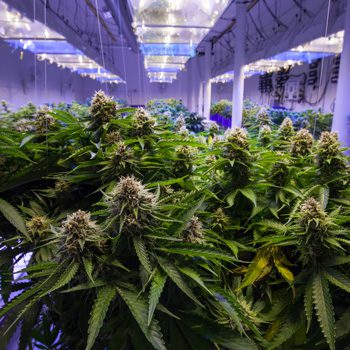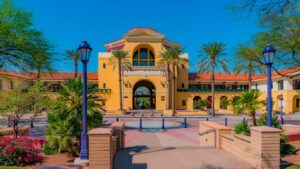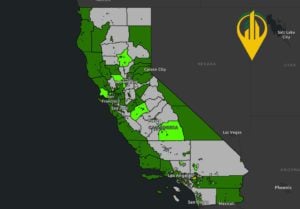One of the biggest struggles of any cannabis business is… finding capital to invest in their operations!
It’s easy to forget that every business in the cannabis industry is basically in start up mode and, like all start up companies, those in the cannabis space also need to find funding for their business. This funding is essential in order to pursue a repeatable and scalable business model.
This creates a major challenge for those entering into a business that is still considered a schedule 1 drug by the federal government but allowed by state governments.

One must navigate different ways to fund operations amongst an ever-changing landscape with, still, only a few banking options available.
But don’t fret as we are about to dive into alternate funding models to consider!
Read this article for more info or click to talk to us about your options for funding at the end of this post.
Real Estate Investor Funding Model
In this article, we will be going into more depth about how and when to use each of the following 4 types of exchanges to generate quick capital, or to buy a cannabis approved property:
- Delayed 1031 Exchange
- Construction/Improvement 1031 Exchange
- Sale leaseback
- Secured Lease/Purchase

Traditional means of financing and access to capital just do not exist due to current banking regulations. A cannabis business cannot simply just go to the bank and get a business loan.
Canadian companies are able to access the public markets to raise funds and we can see they have an inherent advantage over competitors in the US. They’re even entering many US markets and buying up some of the best assets since they have capital ready to deploy.
In California, a cannabis business doesn’t have a lot of good options to raise funds. Today, we would like to share with you new funding alternatives that are emerging as for cannabis operators in California, if you own your property or would like a pro-cannabis investor to purchase the real estate for you.
Positive Tax Implications to Relocate

As Cannabis Real Estate Brokers, we have many clients who are looking for buildings and property to grow their operations, or better their tax implications, which in turn creates better margins.
Operators in cities like San Francisco, Los Angeles, and San Diego want to move to municipalites such as Adelanto, Desert Hot Springs, Palm Springs, Lompoc, Nevada City and many others, because they are able to save $100,000’s to $1,000,000’s / year on their taxes.
How can real estate investors help these startups? By helping them secure larger facilities, with or without a local license, or by licensing through an alternative investment model, they can reduce the time the business is not operational during expansion. Therefore, the business can focus their funds on build out and revenue making investments, such as cannabis related tenant improvements or marketing to sell products.
General Bonuses of using Cannabis Properties for Exchange
- Cannabis properties have great cap rates 12-17%
- Cannabis properties value range in the $500,000-$50,000,000 range allowing lots of versatility
- Cannabis operators are constantly buying properties they lease, which increases your cap rate
- Emerging opportunities across the nation
Types of Exchanges To Fund Operations
If you own a cannabis approved property location and need a quick sale, or are an investor and want a high value property but do not want to manage business operations, these different types of exchanges could be a great solution. There are certain rules to play by and, when followed, can free up a lot of capital for business expansion while creating a reliable cannabis lease agreement.
1031 exchange and sale-leasebacks will be covered in the following details. For a quick overview:
- A 1031 exchange is a real estate transaction that allows you to defer taxes when you exchange “like-kind” business, income, or investment properties.
- A sale-leaseback is an agreement where an asset’s seller leases the asset back from the purchaser. Immediately after sale, the seller of the asset becomes the lessee and the purchaser becomes the lessor, as defined in the leaseback agreement.
Delayed 1031 Exchange
This is the most common 180 day window that most 1031 exchanges will be done through. The client gets 45 days to identify a property after the sale of their property and then has 135 days to close escrow.
- Identify the exchange property while your property is on the market.
- Once you have closed on your property, you must open escrow within 45 days.
Construction/Improvement 1031 Exchange
Perfect for parcels or buildings that need improvements but timing must be taken into account. If you fail to pull permits, or do not get your construction moving forward and prepay a lot of the work, you may fall out of the qualifying window.
- The entire exchange equity must be spent on completed improvements or as down payment by the 180th day. The taxpayer must receive “substantially the same property” that they identified by the 45th day.
- The replacement property must be equal or greater in value when it is deeded back to the taxpayer.
- The improvements must be in place before the taxpayer can take the title back from the qualified intermediary.
Sale-leaseback
Many operators are looking to expand their operations and this creates the ability for a sale leaseback– buying a property from an operator who will then execute a lease with you in tandem.
- Great Cap Rates 12%-17%
- Great for 1031 Exchange
- Ability to lock down capital for expanding operation (Buildout)
- Qualified Operators
Secured Lease/Purchase
Experienced Operators looking to expand their operations/revenue generation, who do not want to spend expansion/build out capital on purchasing real estate.
- Great for Construction/Improvement Exchange
- Guaranteed Cap Rates 12%-17%
- Risk Mitigation
- Qualified Operators
The 1031 Exchange Rules To Follow
These rules are complicated and they must be followed since there are no extensions or exceptions. If you mess up in the process, the IRS could decide you don’t quality for a 1031 exchange and then send you a huge tax bill. Contact us to help you succeed.
Equal Exchange – The property value must be the same as the one being sold, or of greater value.
Contingency – A contingency in the lease states: if the real estate investor executes a purchase agreement on a particular property then the signed lease will be executed in tandem.
Like Kind Qualifications – Like-kind property is another property of the same nature, class, or character. Quality and grade does not matter. Most real estate will be like-kind to other real estate. The 1031 exchange can include like-kind property exclusively or it can include like-kind property along with cash, liabilities and property that are not like-kind. For example, you could sell a 10-unit apartment in Boston and use the funds to buy a cannabis farm in Oregon or a strip center in Florida, as long as you hold as investments and not as personal residences.
1031 tax Deferred Exchange – This is a tool that real estate investors use to trade properties without incurring any taxes on the sale. Section 1031 on IRS.gov
Property or Land in Lease – The property typically involved in a sale-leaseback commercial transaction is a storefront, building, warehouse, etc. but could also be for the land itself. Usually the lease is a “triple net lease,” meaning the seller-tenant agrees to pay all real estate taxes, maintenance, and building insurance on the property in addition to any other costs (e.g., utilities) that are designated under the lease. Source
Property Limit – With a 1031 exchange, the IRS limits how many like-kind properties can be identified during the 45-day period. The most popular rule is the Three-Property Rule, which allows you to identify up to three properties of any value, with the requirement that you buy at least one of them. The next rule is the 200% Rule, which lets you identify as many properties as you can, as long as they don’t exceed twice the property value you sold for. The last rule is the 95% Rule, which also lets you identify as many properties as you want but requires you to buy at least 95% of their total value.
Section 1031 does not apply to exchanges of:
- Inventory or stock in trade
- Stocks, bonds, or notes
- Other securities or debt
- Partnership interests
- Certificates of trust
Read on below to learn about more benefits for using these alternate funding sources and sign up for our newsletter to gain more cannabis industry knowledge.
Cannabis industry insights right to your inbox!
Join our newsletter to learn from Rick Payne and our team at Cannabis Real Estate Consultants.
We will keep you updated on industry insider information, as well as our favorite properties that are compliant and viable for cannabis operations that become available.
Sign up here for insights and insider information:
Sale-Leasebacks on Real Estate Explained
If a cannabis company has its licenses in hand and owns their real estate, then they can raise funds for operations in a sale-leaseback.
A real estate sale-leaseback is a transaction in which the owner-occupant / cannabis operator sells the land and building used in its business operations to a company (usually structured as a real estate trust). Simultaneously, the seller leases the property back from the purchasing company on lease terms that have been agreed to in concurrence with the real estate sale transaction.
Commonly, this will be a long-term investment for the company who buys the property, supporting the negotiation of a mutually agreeable, clear set of lease terms between the seller and investor.
Quick Capital for Licensed Cannabis Operators
This financing option acts as a source of capital to licensed cannabis operators.
 By selling the real estate, and then having it leased back, operators have the opportunity to redeploy the proceeds into their company’s core operations, allowing them to focus their resources on their business. An operator will be able to yield a higher return via capital raised and deployed than they would otherwise get from owning their own real estate.
By selling the real estate, and then having it leased back, operators have the opportunity to redeploy the proceeds into their company’s core operations, allowing them to focus their resources on their business. An operator will be able to yield a higher return via capital raised and deployed than they would otherwise get from owning their own real estate.
Since most cannabis companies are not in the business of owning real estate, but need the land and buildings for operations, this sale-leaseback option makes a lot of sense.
A sale-leaseback enables an operator to reduce its investment in non-core business assets (the land, building & tenant improvements), freeing capital they need in exchange for executing a lease and paying rent. In a way, a sale-leaseback separates the “asset value” from the “asset’s utility value” in a company’s real estate investment.
Benefits for a sale-leaseback of a cannabis operation that owns it’s real estate:
1. Set Your Own Lease Terms
Since the cannabis operator is also the lessee, they have bargaining power in structuring a property lease. The lessee has the opportunity to negotiate a lease agreement with the company acquiring the property that is a win-win.
2. Greater Value to the Real Estate
Unlike a mortgage, a sale-leaseback can often be structured to finance up to 100% of the appraised value of the cannabis operator’s property, building and tenant improvements. A sale-leaseback more efficiently uses the operators investment in the real estate asset as a financing tool.
3. Tax Savings
Generally, the seller/lessee as a tenant can deduct all rent payments as a legitimate business expense on its annual tax returns. As property owners, the depreciation and interest expense are the only tax deductions available. Therefore, a sale-leaseback may have a greater tax benefit, but you should check with your own tax advisor to understand what the total tax implications might be.
It’s important to understand this newly emerging option to finance a cannabis company.
Having capital in hand now can give many more options to expand operations and seize new opportunities. It’s still early in this industry and being able to make strategic moves, with the right capital, is something that can pay many future dividends.
Beware of Schemes – Always Work with a Tax or Real Estate Professional!
The IRS warns taxpayers of “individuals promoting improper use of like-kind exchanges” and using this model as a sales pitch to encourage exchanges of non-qualifying vacation or second homes. Many will refer to like-kind exchanges as “tax-free” vs. “tax-deferred exchanges”, which is incorrect. Read more on the IRS website.
Contact Us to Talk More About 1031 Exchanges and Sale-Leasebacks
Our real estate agents and cannabis property search experts are ready to help with your business growth. Tell us more about your situation and we will get back to your shortly with more information on 1031 exchanges or sale leasebacks if you have a good opportunity.
Please fill out this form and tell us more about what you are looking for:
Related Articles
We recommend these articles to educate yourself further on entering the legal cannabis business.
- Cannabis Lease Agreements
- Investing in Cannabis Tips
- Understanding Cannabis Regulations
- Battle for Dispensary Licenses in California
- Hemps Potential Future in America
- Cannabis Supply Chain
- Cannabis Consulting for Business Success
- 4 Steps in Your Search for a Business Location
Thank you for visiting our website, please take a moment to leave us a comment, read another article, or join our newsletter.





